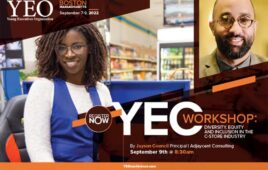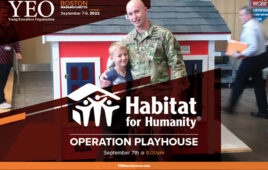 The 2022 NAG Conference in La Jolla kicked off the afternoon on Tuesday, March 29 with a panel discussing Human Resources (HR) solutions amid a labor shortage. Following, the Young Executives Organization (YEO) hosted a session on digital payments.
The 2022 NAG Conference in La Jolla kicked off the afternoon on Tuesday, March 29 with a panel discussing Human Resources (HR) solutions amid a labor shortage. Following, the Young Executives Organization (YEO) hosted a session on digital payments.
HR Solutions
The third general educational session was titled “Human Resources: Staffing, Recruiting and Retaining Personnel in a Labor Shortage.” Speakers included Alex Olympidis, president of operations at Family Express Corp.; Laura Varn, vice president of people & culture and communications at Parkland USA and Peter Rasmussen, director of operations at Neon Markets. Jayson Council, associate faculty at Columbia University, moderated the session.
The panelists touched upon hiring incentives, retention strategies and the importance of personal connections.
Olympidis introduced Family Express as a second-generation family business. One aspect of the company that stands out is its application process, due to its long timeframe. Olympidis noted that he saw many companies implement a short application process, yet Family Express finds success with a 30-day hire time, including three to four days of pass/fail orientation.
He also explained Family Express’ closed, selective interviews with trained interviewers and high pay without bonuses. The company also plans for holidays and focuses on not overworking managers.
“We’re in the business of building relationships,” Olympidis said.
Personalization and humanity are key qualities that have worked well for Family Express. Especially when hiring, showing quick responses and offering more than one personal phone call have set the store apart.
Rasmussen continued the conversation, giving a quick background on Neon Markets. With four, almost five, stores, the company worked with a hotel designer to create the store’s look. It has three models: the signature Neon Marketplace store, Neon Marketplace Express and a Neon Marketplace travel center.
Rasmussen noted that Neon Markets values teaching its store managers to think differently — teaching them flexibility, how to be nimble with scheduling and the importance of treating people well.
Varn also discussed the importance of an emphasis on store managers. Parkland USA believes getting managers what they need allows them to be better ambassadors, which leads to better interviews and employee relationships.
When commenting on recruitment issues at the international company, one of the biggest problems Parkland USA sees is a lack of applications.
“It’s just been incredibly challenging to get folks in the door,” Varn said.
One of the solutions the company is looking at is automation. Additionally, to keep employees, Parkland USA is offering retention bonuses and advanced pay. Community members who become employees can also receive $250 to spend somewhere in the community, such as at a homeless shelter, little league fundraiser or the Red Cross.
On-the-spot hiring, contingent on a drug and background test, has also helped Parkland USA find and retain employees.
Culture is a large part of what these retailers try to sell to their employees.
“We need to be a destination and experience,” said Rasmussen.
Diversity, innovation and human connection are also key to building and retaining a staff.

Speaking: Jeremie Myhren
Digital Currencies
“YEO Breakout Sessions: Understanding the Future of Retail Payment Systems,” discussed the demand for frictionless payments. Speakers Gray Taylor, executive director at Conexxus, and Jeremie Myhren, co-founder and chief information officer at ONRAMP and YEO board chairman, paved the way for further conversation on moving brick and mortar c-stores into the modern era.
According to Myhren, the future of retail payments is frictionless, cardless and decentralized.
He defined friction as counting change, swiping a card, recalling a PIN, waiting in line, poorly trained cashiers, etc. A frictionless environment is a fast checkout experience, low- or no-touch, and reduced steps and contact points — essentially a payments process integrated with a good customer experience.
“I think there’s a spectrum of where frictionless fits,” Myhren said.
Friction results in customers driving past a store because the lot is full, not grabbing or putting back a product when a purchase is planned and general frustration, according to Myhren. There are too many steps in the process.
“Bottom line is there’s a lot of different solutions,” said Myhren, such as a kiosk-based option. He believes embracing solutions that give customers options is important.
One option that he implored retailers to implement is “tap to pay,” as well as cardless options such as QR codes. He believes that retailers should take advantage of technological opportunities with apps and payments because “loyalty and payment these days are almost becoming interchangeable.”

Speaking: Gray Taylor
Taylor agreed with the idea of becoming more convenient. Conexxus welcomes technology standards and mobile commerce platform standards. The company identifies emerging trends and evaluates tech to business need and profitability.
Regarding digital platforms, Taylor said the big themes are that fundamental technologies drive digital life, digital life requires digital versions of real things and digital identity is the foundation of the future.
He spoke about the Internet/Web of Things (IoT) and networked devices collecting and acting on real-time data. He mentioned the relevance of projecting online intelligence to the real world, enabling hyper-customization/automation.
“The goal is to improve the customer experience with less and use deep learning to do it,” said Taylor.
The future is a decentralized Web, he said — a seamless merger of digital and physical worlds.
Both speakers stressed how the importance of platforms allowed into the store from a tech perspective are going to be more critical going into the future.
The 2022 NAG Conference ends on March 30. Current and potential attendees will be welcomed at next year’s conference, which will take place in Austin, Texas at the JW Marriott Austin from March 26-29, 2023.




